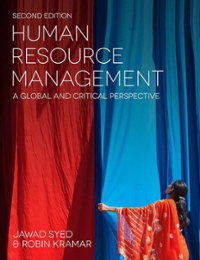From the employers' perspective, such arrangements allow them to capture skilled employees before they are properly qualified
Question:
From the employers' perspective, such arrangements allow them to capture skilled employees before they are properly qualified to enter the labour market in their chosen area. Director of the GradConnection graduate job placement service Mike Casey has commented, 'What we see from our clients is that the majority use internship programs as a kind of "try before you buy" in preparation for their graduate programs.' At Deloitte, the firm looks for students with degree backgrounds and those who are able to bring diverse experiences or backgrounds to the consultancy. 'We try and offer a fun and engaging program that aims to support summer vacationers and interns to determine their future career direction and to experience all the elements that make Deloitte a great place to start their careers,' says Gemma Hudson, Deloitte talent graduate manager. 'There is the opportunity to be offered a graduate role for the future as a result of their placement with us.' (Callaghan, 2015).
Such graduate placements are popular in creative industries such as the media, advertising and public relations where it is important to see how a prospective employee applies the knowledge that he or she has learnt at university. There have, however, been reactions about the amount of work that is being expected of interns and the trend towards internships becoming a cheaper and easier substitute for paid work (Redrup, Han and Tadros, 2014). There are also dangers for employers who do not monitor the employment conditions of interns in the same way as permanent staff. Resultant intern experiences raise questions about the risks of reputation damage for the business or even loss of intellectual property or other secrets that could come from a disgruntled former intern. 'Employers need to be aware that there are risks and need to think about the steps they can take before interns come in, like what will the person be exposed to, what will they be doing?' says Middletons employment and industrial relations lawyer Lucy Shanahan. 'Have we defined anything we don't want them to be exposed to? And what can we do to limit that exposure?' (Bleby i2012).
Many talented workers are willing to work for free in exchange for experience, but there are risks to companies who are not aware of their legal obligations before taking on unpaid interns. A partner of Middletons law firm's workplace relations and safety group, Seamus Burke, says that in its most simple form, an unpaid engagement (with the exception of accredited vocational placements) that exceeds simple observation and shadowing activities could be classified as employment and requires compensation. 'The rules are there really to deliver experience by osmosis.'
However, Burke says it's difficult to ascertain just who derives the benefit from an internship. 'Someone might say that they're willing to get experience, to do whatever jobs you ask them to do and then three months down the line, they then say it's a situation of employment and the employer is subject to compensation claims.' (Hutchinson, 2012).
Questions
1. The companies that offer internships are providing students with a valuable opportunity to gain experience, so why should they go out of their way to make sure that students enjoy the experience?
2 How can companies ensure that interns have the same value alignment as permanent employees with the company? Is such value alignment actually necessary?
Step by Step Answer:

Human Resource Management A Global And Critical Perspective
ISBN: 9781137521620
2nd Edition
Authors: Jawad Syed, J; Kramar Syed, Robin Kramar





